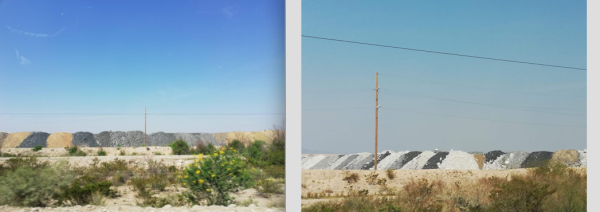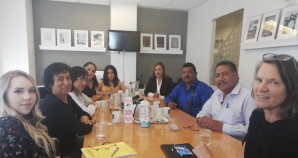Mexican Community Seeks Help in Mining Conflict

Pictures of the Peñasquito mining operation in Cedros, Zacatecas, courtesy of Red Solidaria.
by Olivia Mozdzierz
New York, November 26, 2019 – Representatives of a community of Mexican ejidatarios (communal landowners) from north-central Mexico met recently with the National Security Archive in our New York office to tell us about their ongoing struggle with a foreign mining company over land, water, and industrial pollution. They sought assistance from the Archive in gaining access to official information that could aid their campaign for attention, support, and redress from national authorities and global audiences.
The group from Cedros, a small, rural community in the Mexican state of Zacatecas that has been effectively taken over since 2006 by the U.S. Newmont Goldcorp polymetallic mine, told us that community members entered into a rental agreement with the mine without legal counsel and only later realized what they now view as the company’s predatory intent. According to news reports, the agreement provided 50,000 pesos to each ejidatario – or roughly $2,600 USD – for rent for 30 years. The sum amounts to about $85 per person, per year, for three decades of use of the land. Newmont Goldcorp stands to make hundreds of millions of dollars in profits.
Meanwhile, the environmental impact of the mine on nearby communities – including Cedros, El Vergel, Mazapil, and Cerro Gordo – has been devastating. The local water supply is reportedly heavily polluted and has caused skin and eye infections, as well as other illnesses. The Cedros team explained that people must now purchase their drinking water – a stark contrast for a region where communities drew their water from clean wells for hundreds of years. Agricultural land is also now polluted by the chemicals from the mines, damaging fields and making crops useless. According to the team and most media accounts, the mining company has failed to provide any real solutions or compensation for the damage.
On their October visit to the National Security Archive’s New York office, the Cedros group included Magdalena López Paulino from Red Solidaria Década contra la Impunidad, a national human rights and anti-impunity organization, along with local human rights advocates from Zacatecas and Coahuila, lawyers and community members. López Paulino explained that the Red Solidaria had scheduled meetings with the Inter-American Commission for Human Rights as well as non-governmental human rights groups, U.S. congressional offices, and the press to try to raise awareness about the abuses faced by residents of the affected area. (Read the call for Urgent Action by Red Solidaria here.)
In response to these abuses, Cedros community members have staged blockades and protests to demand the observance of their rights to land and health. They have effectively shut down the mine for months at a time twice during 2019. Recently, however, promises of help from the Zacatecas state government have given way to a harder line from the governor, resulting in the threat of police or military action against protestors as well as prosecution of community leaders. As a result, protesters were forced to abandon their latest blockade on October 27 and are now engaged in negotiations with Newton Goldcorp. They remain disillusioned by the company’s response.

Photographed (right to left): Kate Doyle, Felipe de Jesús Pineda Hernández, Juan Anastacio López López, Irma Judith García Ruíz, Ie Tze Rodríguez López, Karina López Puentes, Deeni Rodríguez López, María Magdalena López Paulino, Olivia Mozdzierz
Karina López Puentes, one of our visitors and a resident of the affected region, underscored the problem of corruption as one of the major obstacles they face, maintaining that “it is a very corrupt area, so despite the ongoing fight for change, nothing has been done. The community is looking for help, for people to listen and spread the word.”
Unfortunately, the situation in Cedros is an example of a much bigger issue throughout the region where the extractive industry has come into conflict with local communities. According to media accounts and NGO reporting, tensions are rising in Guatemala, El Salvador, and Nicaragua due to extraction operations. Governments tout mining as an economic boon to local communities, but this is seldom the reality. What is left out of this narrative are the severe environmental impacts, dislocations, and the fact that these mainly foreign mining companies generally outsource their labor.
On the western highlands of Guatemala, Huehuetenango has been the site of many intense, long-term battles over mining and hydroelectric dam projects. It has been reported that indigenous activists have been killed and community leaders detained for their protests and opposition to the projects. Similarly, in Nicaraguan gold mining areas of Santo Domingo, Limón, and Bonanza, community opposition is met with threats, intimidation, police repression, and criminal charges. By contrast, El Salvador stands out for new legislation to ban the practice of mining for metal, a law that is the first of its kind. Even with this legislation in place, local activists still worry that disputes over mining will arise again in the future.
The Archive’s visitors from Cedros stressed the need for greater oversight of the Peñasquito mining operation given the lack of substantive response to the community’s concerns from federal and state authorities and the potential for open conflict. The National Security Archive will work with the Red Solidaria and Cedros community activists to file Freedom of Information Act requests for information that can advance public understanding of this environmental disaster and the hardships suffered by affected communities.

Comments are closed.